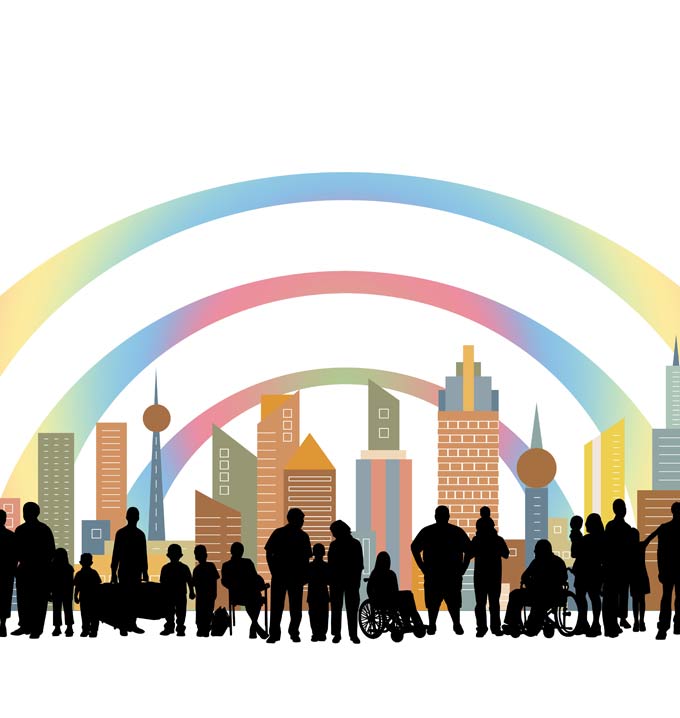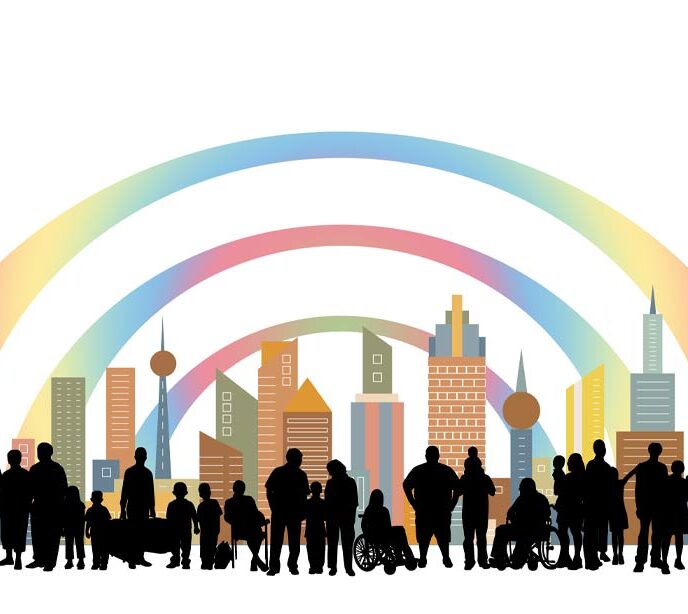Overcoming Stereotypes
Autism stereotypes are common and can have significant social consequences for autistic children. Misconceptions hinder the acceptance and inclusion of autistic children. Challenging these stereotypes is vital for creating a more understanding and supportive society.

Challenging Common Autism Stereotypes
When people hear the word “autism,” they often imagine a narrow set of images, like the brilliant but emotionally distant card-counting savant in “Rain Man” or a quiet, withdrawn child lost in their own world. These portrayals have shaped how society sees autism for decades, if not longer, but the reality is far more complex.
Autism is not a stereotype. It’s a spectrum, filled with unique individuals who experience the world in beautifully diverse ways. And while some stereotypes may seem harmless, they can create real barriers for children with autism, limiting how others see them, how they’re treated, and the opportunities they’re given.
At Lighthouse Autism Center, we believe understanding starts with awareness. In this blog, we’ll explore some of the most common myths and misrepresentations about autism, how these misconceptions affect children, and what we can all do to help create a more accepting, inclusive world.
Understanding Common Autism Stereotypes
Autism is often misunderstood, and with that misunderstanding comes a range of stereotypes that don’t reflect the true experiences of autistic individuals. These stereotypical behaviors in autism are widely circulated, but they rarely reflect the full, nuanced picture.
These oversimplified ideas — like assuming people with autism lack empathy or have intellectual disabilities — can actually be deeply harmful. They’re rooted in misinformation, and when left unchallenged, they shape how children with autism are seen, supported, and included. Here are a few of the most common stereotypes of Autism Spectrum Disorder (ASD).
Lack of Empathy
There is a belief that children with autism lack empathy or are unable to understand others’ emotions. In reality, many children with autism do experience and express empathy, just not always in ways that are expected or even recognized while they’re happening. Social communication challenges may impact how they express or interpret emotions, but that doesn’t mean that empathy isn’t there. Often, it simply looks different.
Intellectual Disabilities
The assumption that children with autism have intellectual disabilities is also a prevalent stereotype. While some may have specific intellectual challenges, many have average or above-average intelligence. Autism primarily affects social communication, and intelligence levels vary significantly, just as they do in children without autism.
Savants
The portrayal of all individuals with autism as possessing exceptional savant abilities is also misleading. While some do exhibit extraordinary skills in specific areas, this does not reflect the entire autism spectrum. Most individuals with autism have a wide range of strengths and challenges, just like anyone else. It’s important to recognize that non-stereotypical autism exists, too. Many children on the spectrum defy these limited portrayals and express themselves in wonderfully varied ways.
Socially Awkward and Withdrawn
Another stereotyped behavior in autism is that of being socially awkward, withdrawn, or uninterested in social interaction. This is patently untrue. Many people with autism desire social connections and are able to establish meaningful relationships. Some may have difficulties communicating effectively, while others may have excellent communication skills. Just like social preferences vary among all children, they also vary within the autism community.
Rigid and Unchanging
Another stereotype suggests that all individuals with autism are rigid and resistant to change. While it’s true that children with autism tend to find comfort in routine, preferences for structure and predictability vary greatly, depending on their individual circumstances and where they sit on the spectrum.
Social Consequences of Autism Stereotypes
Society often perpetuates harmful stereotypes about autism that can have far-reaching consequences. The negative impact of these stereotypes manifests in numerous ways, from limiting educational opportunities, fostering employment discrimination, and promoting social exclusion to impeding access to healthcare and support services. Here are some of the most common consequences.
Limited Educational Opportunities
One of the most significant impacts of autism stereotypes is limited educational opportunities. Stereotypes portray children with autism as incapable of learning or being successful academically, which leads to low expectations from educators, administrators, and peers. These kinds of assumptions often stem from a narrow focus on autism stereotypical behaviors, ignoring the broad diversity within the spectrum. As a result, individuals with autism may be denied access to mainstream classrooms or subjected to inappropriate educational placements, hindering not only their intellectual and social development but also their confidence and sense of belonging.
Social Exclusion and Bullying
Another major consequence is social exclusion and bullying, robbing children with autism of meaningful relationships and connections while also lowering their self-esteem and damaging their ability to trust others.
Preconceived notions about social awkwardness or lack of interest in social interaction perpetuate isolation and loneliness. These stereotypes create barriers to forming friendships and participating fully in social activities, leading to a diminished quality of life.
Ignorance about autism and the bullying of individuals with autism are often related. Many times, bullying stems from fear or discomfort, especially from children without autism who don’t understand autistic behavior and respond with derision or cruelty. This seriously impacts children with autism ability to connect meaningfully and has a long-lasting impact on their self-esteem.
If you feel your child may be a bully who is contributing to the social exclusion of a child with autism, here are some tips on how to overcome stereotypes, build empathy, and encourage kindness:
- Educate your child on autism.
- Teach them about universal acceptance through empathy.
- Foster tolerance of diversity and difference and teach kindness.
- Turn them into autism activists through advocacy.
Access to Appropriate Healthcare and Support Services
Another significant impact of autism stereotypes is the limited access to appropriate healthcare and support services. These misconceptions often paint autism as a defect or something that needs to be “fixed” rather than a natural variation in human neurology. This misguided perception can lead to a lack of appropriate interventions, delaying or denying autistic individuals the support they need to thrive.
Ways to address the negative impact of stereotypes
Overcoming stereotypes about autism requires a collective effort from individuals, communities, educational institutions, and policymakers. By challenging misconceptions, promoting acceptance, and fostering inclusivity, we can create a more equitable and understanding society for children with autism. Here are a few ways we can all help to overcome these stereotypes.
Education and Awareness
Distributing accurate information about autism is crucial to challenging stereotypes. Educational programs in schools, workplaces, and communities can dispel misconceptions and enhance understanding. Awareness campaigns, workshops, and seminars raise consciousness and debunk stereotypes.
Encouraging Personal Narratives
Sharing personal experiences and stories from children with autism and their families challenges stereotypes and provides a nuanced understanding. Such narratives humanize the condition, exposing diverse strengths and abilities. Books, blogs, documentaries, and public speaking engagements offer platforms for sharing stories.
Promoting Positive Representation
Media significantly shapes societal perceptions. Encouraging accurate and positive portrayals of autism in films, TV shows, and media challenges stereotypes. Portraying individuals with autism as capable and multifaceted combats misconceptions and fosters inclusivity. The best way to promote positive and accurate representation of autism is by engaging with media, either created by autistic people or where autistic characters are represented by people with autism. We need to move away from allistic portrayals of autism (and away from the “Rain Man” trope entirely).
Advocacy and Support
Active advocacy for the rights and inclusion of children with autism is crucial. Communities, individuals, and organizations can work toward systemic changes, such as inclusive education, employment opportunities, and accessible support services. Amplifying the voices of autism and advocating for their needs helps combat stereotypes.
Building Sensory-Friendly Environments
Many children with autism have sensory sensitivities. Creating sensory-friendly environments in schools, public spaces, and events promotes comfort and inclusion. This approach reduces anxiety and thereby reduces the chance of the child having to self-regulate with “stereotypical” behaviors that may draw unwanted attention to them.
Building Empathy and Acceptance
Promoting empathy and acceptance in our communities and households is vital to challenging stereotypes and fostering an inclusive society. Educational programs and workshops focus on understanding and appreciating the unique perspectives and experiences of children with autism.
Engage with the Autism Community
Actively engaging with the autism community, attending support groups, participating in autism-related events, and listening to their experiences provides valuable insights to challenge stereotypes. Meaningful dialogue and involvement of the autism community in decision-making processes ensure their perspectives are respected.
Access to Healthcare
Access to specialized healthcare, early intervention programs, and therapeutic services is crucial for the well-being and development of children with autism. By dispelling stereotypes and advocating for equitable access to comprehensive services, every child on the spectrum can receive the necessary resources to reach their full potential.
Break down stereotypes with Lighthouse Autism Center
By implementing these strategies, society can challenge and overcome autism stereotypes. With Lighthouse Autism Center (LAC), you can find many more autism resources to help you advocate for a better understanding of the challenges facing children with autism. And with LAC’s Lighthouse Fusion ABA Therapy, you can prepare your child for the world.
Together, we can unlock your child’s potential
Related News

06/11/2025
Overcoming Stereotypes
Autism stereotypes are common and can have significant social consequences for autistic children. Misconceptions hinder the acceptance and inclusion of autistic children. Challenging these stereotypes is vital for creating a more understanding and supportive society. Challenging Common Autism Stereotypes When people hear the word “autism,” they often imagine a narrow set of images, like the […]

06/11/2025
What’s Next After ABA Therapy?
There are a number of reasons why an autistic child might stop ABA therapy, and one is that they have reached their goals. In this article, we take a look at what parents can expect going forward. What Are the Next Steps After ABA Therapy? As a parent, you only want what’s best for your […]

06/11/2025
Do Babies with Autism Smile?
We take a look at the importance of early intervention, some of the milestones for parents to look out for, and the more common signs of autism in babies. Do Babies with Autism Smile? Watching your baby grow is an exciting time, certainly one of life’s quiet wonders. From those first sleepy stretches to the […]


